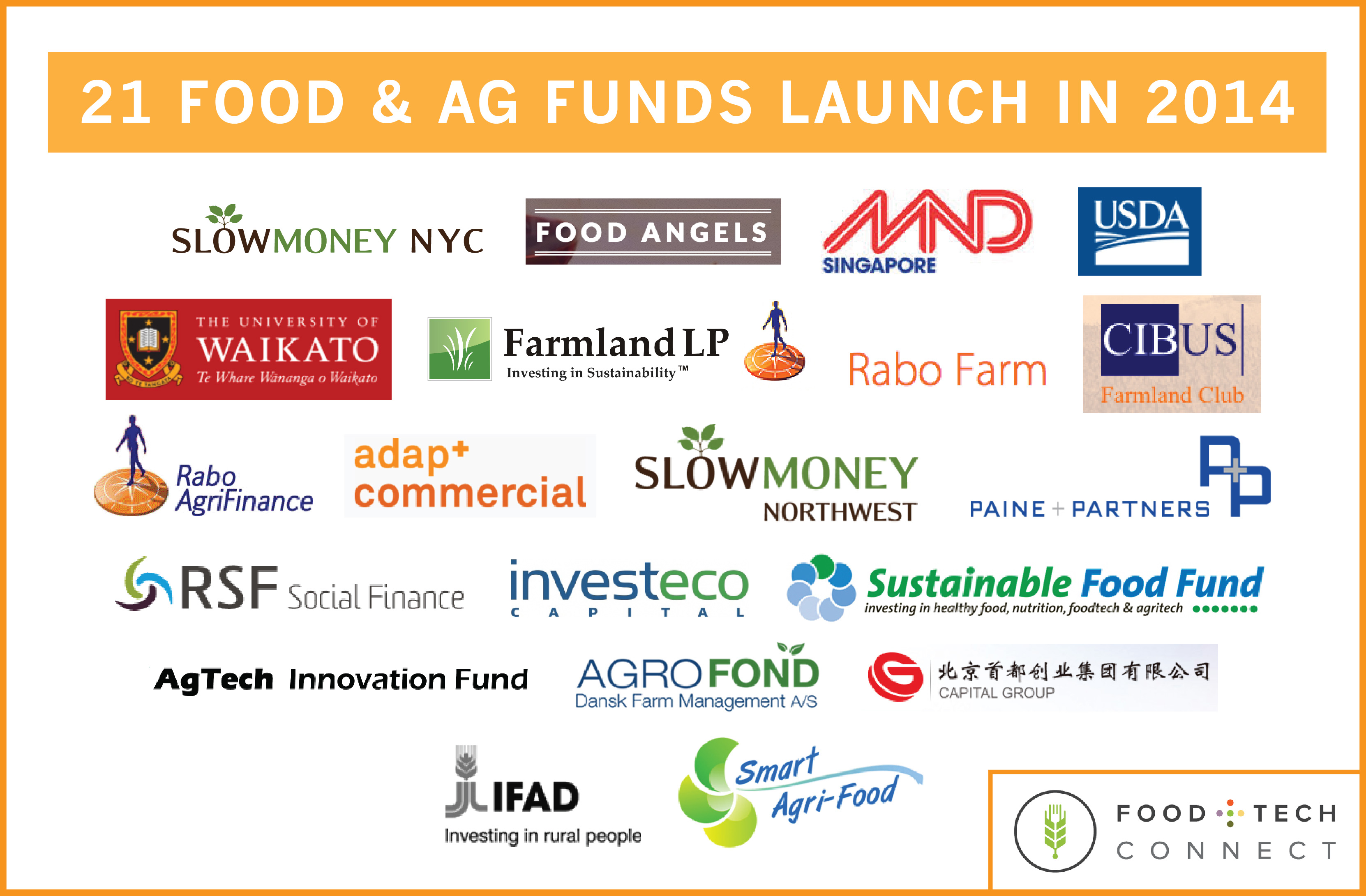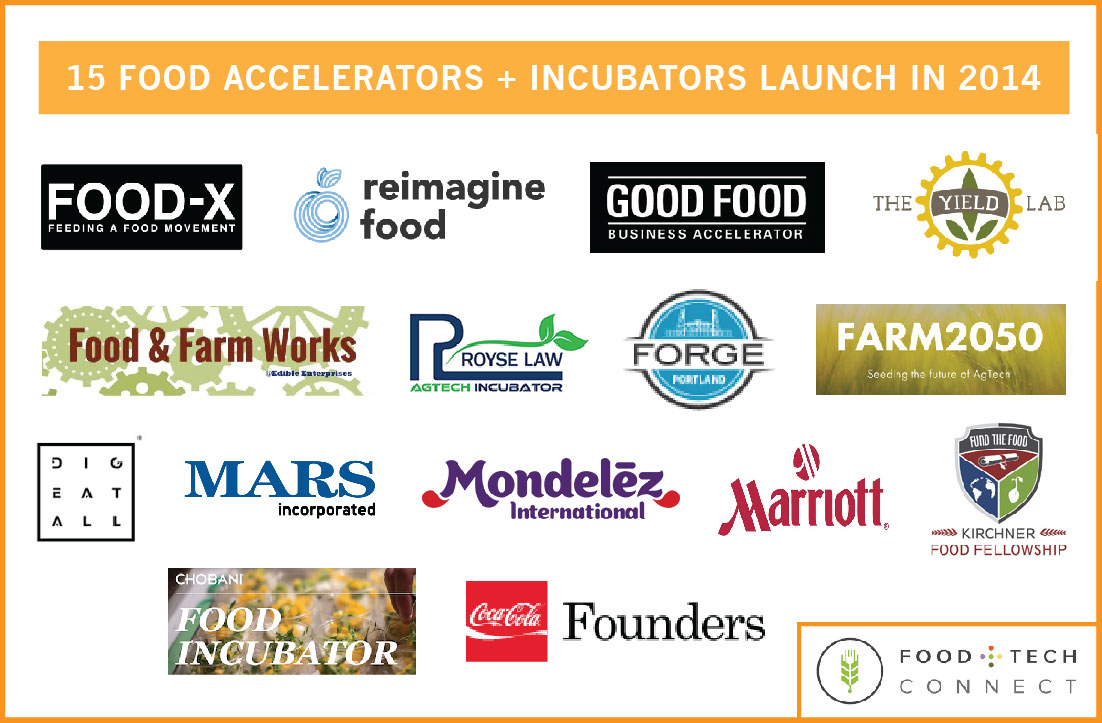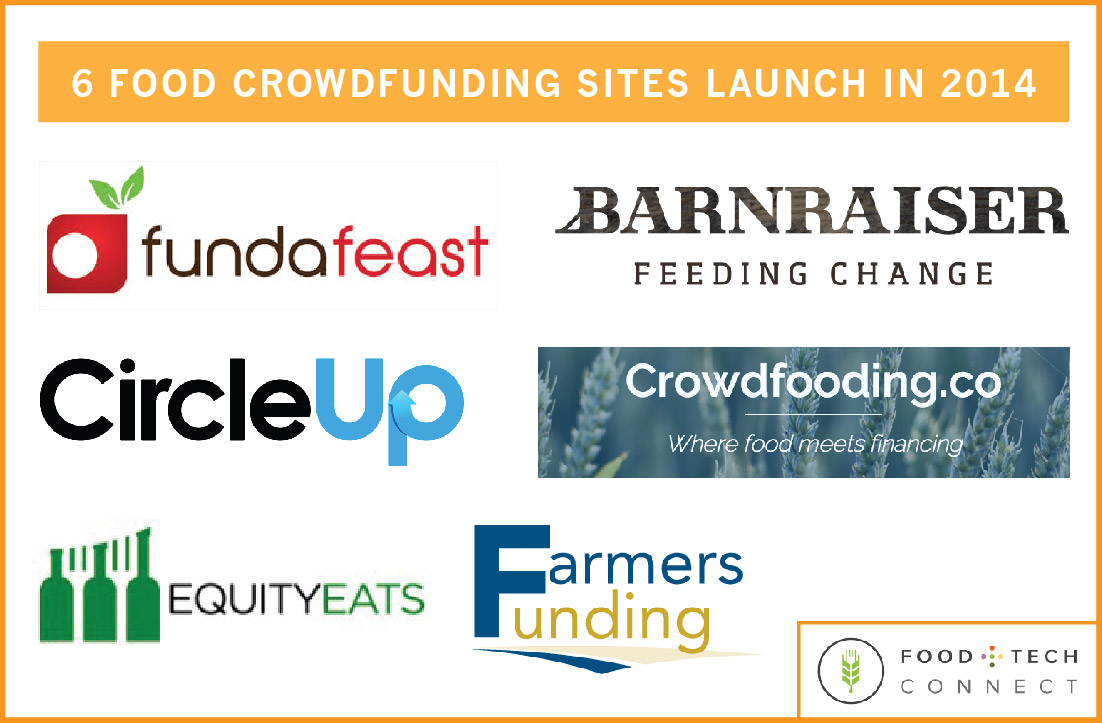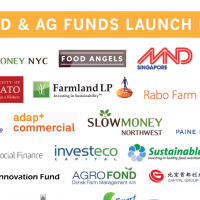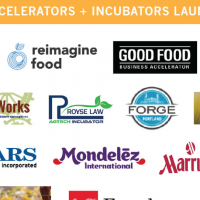Funding for the food tech and agtech space is exploding. In 2014, a whopping 42 new funding opportunities launched (up from 26 in 2013) including 21 investment funds, 15 accelerators and corporate incubators and 6 crowdfunding platforms.
To help you stay on top of all the action, we published a funds list, an accelerator/incubator list and a crowdfunding list in early 2015. But over the past few months we’ve received lots of requests for a comprehensive list with everything in one place. So here it is. You’ll find more information on all 42 new funding opportunities below.
Did we miss anything? Let us know in the comments section, and we’ll add it to the list.
_____________
Food-Focused Angel Funds
Food Angels
This group of accredited angel investors invests in early-stage food, beverage and food tech companies based in the US. Investments rage from $25,000-300,000 in the form of equity or debt and royalties in C-Corps or LLCs. Its investments include Wine by Design and iJukebox.
Foodshed Investors NY
SlowMoney NYC’s network of angel investors funds local food businesses that are aligned with its principles. The network offers entrepreneurs the opportunity to borrow money from their neighbors, customers, and others interested in helping them succeed. Its investments include Blue Marble Ice Cream.
US Food & Agriculture Investment Funds
AgTech Innovation Fund
This $50 million venture capital fund wants to transform our food system by supporting technology innovation from field to plate. It invests in early-stage, North American agriculture and life science startups that increase productivity and sustainability, as well as modernize distribution chains. It plans to invest $250,000 to $500,000 in initial seed rounds, with the possibility of follow-on investments in successful companies.
Boulder Food Group LP
Formed by venture capitalist and natural food executive Tom Spier, the group has raised $32.8 million for a new pooled investment fund. Spier’s Bolder-based company Spier Capital Management has already invested in ibotta and Evol Foods.
The Cascadia Foodshed Funding Project
The Project makes investments of $25,000 to $250,000 in Pacific Northwest social enterprises focused on improving health, social equity, family wage employment and rural community resilience. Slow Money North West’s project is a collaboration of foundations and individual impact investors who want to invest capital in regional food and farm businesses, including Empire Health Foundation, JP Morgan Chase Foundation and Ecotrust Natural Capital Fund. The project combines a variety of capital sources, like grants, equity, loans and credit enhancements.
Farmland LP REIT
Farmland LP, an investment fund that acquires conventional farmland and converts it into certified Organic, sustainable farmland, announced an open call for investment in its $250 million real estate investment trust (REIT). The REIT will allow accredited investors to own part of the funds’s portfolio of farmland.
Made In Rural America
As part of the Obama Administration’s “Made in Rural America” initiative, Secretary of Agriculture Tom Vilsack created this $150 million fund to propel small businesses in rural America. The Rural Business Investment Company (RBIC) enables the USDA to facilitate private equity investments in cutting-edge agriculture businesses. Advantage Capital Partners manages the fund, along with partners from eight Farm Credit institutions.
RSF PRI Fund
With support from the Surdna Foundation, RSF Social Finance (RSF) announced a new $750,000 investment in its Program Related Investing Fund (PRI). The fund provides support for foundations who want to participate in program related investing, but lack the in-house capacity to do so. Foundations invest a minimum of $100,000 with a five-year term and receive a 1 percent annual return. These investments provide loans of $50,000+ to companies that tackle food production, food access, value-added processing, distribution, retail and waste management.
Rural Infrastructure Opportunity Fund
This $10 billion investment fund will give pension funds and large investors the opportunity to invest in agricultural projects, including wastewater systems, energy projects and infrastructure development in rural America. The fund is a public-private partnership between CoBank, Capitol Peak Asset Management (CPAM) and the U.S. Department of Agriculture. It aims to work in tandem with existing government loan and grant programs by making debt investments in a wide range of projects.
International Food & Agriculture Investment Funds
Agriculture Productivity Fund
Singapore’s Ministry of National Development, Agri-Food and Veterinary Authority and National Parks Board announced a $63 million fund to help boost the country’s farming productivity. The fund is broken into two sections: $53 million for farm development to support productivity improvements in the farming sector and $10 million to support R&D in agriculture productivity tech.
“AgriHub”
New Zealand’s University of Waikato launched this agtech seed fund with a conglomeration of nine-institutions. Investments will range in size from NZ$5,000 to NZ$30,000 and will focus on projects that are tackling everything from sensing and automation to alternative energy and bio-materials.
Agri-Innovation Venture Capital Fund
Japanese venture capital firm Tsukuba Technology Seed (TTS) teamed up with the UK’s Adapt Low Carbon Group to launch this $13.6 million agricultural innovation venture capital fund. The fund focuses on investments in small- t0 medium-sized agtech businesses that focus on water and energy efficiency, precision farming, disease and pest control for crop production and irrigation.
Beijing Australia Agricultural Resource Cooperative Development Fund
This $3 billion fund invests in Australian agriculture. A joint partnership between state-owned Beijing Agricultural Investment Fund and the Shenzen-based Yuhu Group, the fund invests in Australian dairy, beef, lamb and aquaculture assets.
Dansk Farmland
AP Pension’s €11.9 billion commercial pension fund is focused on supporting Danish agriculture. The fund buys farms in Denmark and leases them back on long-term contracts to the individual farmers. It made its first investment in early 2014 with the completion of the purchase of a 190-hectare cattle farm.
India Agri Business Fund II
The $100 million fund is Rabo Equity Advisors‘ second fund. It will make $15 and $17 million investments in 10-12 companies beginning in January 2015. Through its first fund India Agri Business Fund I, it invested $120 million in 10 companies, including LT Foods Limited, Daawat Foods Limited and GeePee Agri Private Limited. India Agri Business Fund II will close in October 2015.
Investco Sustainable Food Fund
Canada-based Investeco, an environmental investment company, launched the Investco Sustainable Fund to invest primarily in Canadian expansion-stage companies that focus on sustainable food and agriculture. The fund is led by Canadian investors, including The J.W. McConnell Family Foundation, The Harbinger Foundation, the Inspirit Foundation, The Metcalf Foundation and Tides Canada Foundation. Sun Select, a British Columbia-based sustainable greenhouse company, was its first investment.
Paine & Partners Fund IV
Paine & Partners closed $893 million in capital commitments for its fourth fund. The fund will focus on investing in the global food and agribusiness industry, into which the private equity firm has already deployed more than $1 billion over the last decade.
Rabo Farm Europe Fund II
Launched by Rabo Farm in January 2014, this 10-14 year closed-end fund is targeting €300 million of commitments to invest in agricultural assets in Central and Eastern Europe. The fund aims to increase agricultural efficiency by using less farm inputs per hectare of agricultural land, while producing more. Consolidation, water management, soil efficiency and infrastructure are its main focuses.
Romanian JV Fund
Agriinvestor announced the launch of the Cibus Farmland Club, a fund aimed at small- to medium-sized investors to complete a €50 to €100 over the next two years. The club was formed through a partnership between DLV Plant, Farmfield, Interfarms, Van Campen Liem and Ernst & Young.
Sustainable Food Fund
Pulsar Network Capital launched this €75 investment fund to invest in healthy and sustainable food. The Netherlands-based fund plans to invest in 15-25 innovative companies that have the potential to contribute to a healthier, more transparent and more sustainable food system.
The Small and Medium Agribusiness Fund
Managed by the EU and Uganda’s International Fund for Agriculture Development, the 10 to 15 year fund and makes €200,000 to €2m investments in agribusinesses. The €25 fund allows 35 private small- and medium-sized Ugandan agribusiness enterprises to take advantage of interest-free grants.
Food Startup Accelerators & Incubators
Dig Eat All
This five-week acceleration program is based in San Sebastian, Spain. It focuses on accelerating startups that are innovating the food, ag and health value chains. The intensive program offers mentorship, workspace, up to €250,000 in funding and strategic partnership opportunities.
FOOD-X
They New York-based business accelerator is focused on launching food-related businesses with a multi-stage evergreen fund SOS ventures. It partners with early-stage food, beverage and health food companies to help them successfully take their products and services to market. The program provides up to $50,000 in funding in return for 8 percent equity, as well as regular sessions with food and tech luminaries. Food-X is currently seeking the best and brightest food innovators to join its second accelerator program beginning in Spring of 2015.
Farm2050
Launched by Google Chairman Eric Schmidt, Innovation Endeavors and Flextronics Lab IX, the Farm2050 collective is dedicated to advancing the future of food by supporting agtech startups. While not an incubator or an investment fund, it brings together researchers, farmers, entrepreneurs, manufacturers, and distributors to help new disruptive AgTech ventures grow. Companies can pitch Farm2050 to gain access to its resources, which include capital, prototyping facilities, manufacturing capacity, distribution channels and more.
Forge: Food
This Portland, Oregon based 6-week accelerator program selects food entrepreneurs that are looking to scale their product regionally or nationally and helps them aggressively scale their business, grow their brand and develop a competitive business strategy. Participants pay $,1500 to participate in the program and leave with a growth plan, a brand positioning statement and a 30-second promotional video for their product.
Fund the Food
A partnership between Kirchner Group, The Hunger Solutions Institute Universities Fighting World Hunger, the program selects a group of students from top North American universities and provides academic training, business mentors and financial capital for them to invest in business that address global food security issues. The program aims to accelerate the global deployment of ground-breaking sustainable technology solutions. Ideal candidates for the fellowship should have strong academic credentials and an entrepreneurial spirit.
The Good Food Business Accelerator
Run by FamilyFarmed, the Chicago-based accelerator aims to give food and farm startups the skills to launch or scale their businesses. The intensive six month program is open to regional food and farm entrepreneurs, including food makers, processors and retailers, restaurants, farmers and food tech companies. The program does not take equity in the business it incubates. Instead, fellows will pay an annual fee to FamilyFarmed based on the increase in revenue their businesses experience.
NOFFN Incubator
The New Orleans Food & Farm Network (NOFFN), in partnership with St. Charles Parish, launched a commercial kitchen/business incubator for local food entrepreneurs. In addition to kitchen space, it offers training in food sanitation, equipment operation and kitchen protocols. Its goal is to lower the barriers to success for new food businesses and re-localize the food economy in the New Orleans area.
Reimagine Food Prometheus
The Barcelona-based accelerator selects 20 innovative food tech startups each year to take part in a three-and-a-half month training program which includes networking with leading global entrepreneurs, food companies and funding sources. It also offers a common working space, which brings food producers, entrepreneurs, investors and chefs together to experiment with the restaurant, kitchen and supermarket of the future.
RoyseLaw AgTech Incubator
The RoyseLaw AgTech Incubator provides 6 to 8 promising game-changing agtech companies with work space, mentorship, speaker programs, access to markets and venture funding. Applications just closed for its January 2015 cohort, but stay tuned for future application instructions here.
The Yield Lab
The Yield Lab is focused on bolstering new agricultural technology by supporting early stage AgTech companies. It provides St. Louis-based companies with $100,000 in funding, mentors and connections and selects four to eight companies each year for its 9 month program.
Corporate Food Incubators
Chobani Food Incubator
The program will invest in, support and help scale emerging food businesses that uphold Chobani’s belief in making delicious, nutritious, affordable food with natural ingredients. Based in NYC, the incubator will provide entrepreneurs with resources, workspace and support to launch their products. The six-month program will also provide entrepreneurs with access to its extensive network including to top chefs and industry leaders.
The Innovation Institute for Food and Health
Mars Inc. announced a $40 million, 10-year commitment to develop the institute at the University of California Davis World Food Center. It will focus on sustainable food and agriculture, as well as food safety and production.
Marriot Food & Beverage Incubator
Mariott is inviting food startups, chefs and bartenders to pitch their concepts to a small group of Marriott hotels. Over the first half of 2015, the number of hotels will grow 12 hotels internationally. Winning concepts will receive resources, space and support. And after a six month trial period those concepts will be evaluated based on popularity and return on investment.
Mobile Futures in Australia
Created by food giant Mondelēz, the program paired five of Australia’s biggest brands with five startups (Issue, Proximiti, Snaploader, SkyFii and MyShout) to help accelerate and scale its mobile innovations in just 90 days.The Company since reported that it surpassed its goals to innovate its brands and and deliver future opportunities for the startups. Pervious iterations of the program took place in the U.S. and Brazil.
Coca-Cola Founders Program
Coca-Cola’s new startup incubator gives experienced entrepreneurs up to $1 million in funding and connects them to strategic advisors and business opportunities within the 700,000 person company. The program aims to get innovative ideas off the ground and help startups raise Series A funding and beyond. Coca-Cola begins as the lead backer, and once a startup’s model is proven it becomes a minority shareholder. Participants in its first cohort included food startups Home Eat Home and iHydrate.
Food Crowdfunding & Investor Matching Platforms
Barnraiser
The California-based crowdfunding platform has an ambitious goal of helping the innovators who are creating a better future for food to raise $1 billion. Since launching in May 2014, 21 of the 28 campaigns run through the platform have been successfully funded, including projects for a chicken processing facility, an elementary children’s garden and a nut-free snack line. The platform takes a 5 percent cut of successfully funded projects, and its payment processing partners take 4-5 percent. Projects must be looking to raise at least $2,000.
CircleUp Circles**
By far the most popular and well-funded of the food crowdfunding websites, CircleUp connects accredited investors with consumer product good and retail companies. This year it launched Circles, which are managed funds that allow investors to access multiple investment opportunities at a lower investment minimum.
Crowdfooding
The platform aims to make the investment process easy for food entrepreneurs by connecting food startups and investors. It currently offers a matching making service tool, which features a commercial database of active food investors. The database includes information like the number of investments completed, average investment value, investment portfolio composition and investor location. Food entrepreneurs can test the product via a free trial. According to its website, Crowdfooding is building an equity-based crowdfunding platform for food startups.
EquityEats
The Washington D.C-based equity crowdfunding platform helps foodservice businesses like bars, restaurants and bakeries raise capital to build and sustain their businesses. Each project is limited to 100 investors, and those investors must be accredited. EquityEats is all-or-nothing, so if the project doesn’t meet it’s funding goal, the funds will be returned to the investors. Entrepreneurs have to pay a set a business support fee to raise money on the platform.
Farmers Funding
Symbid launched this online investment platform for the Dutch agricultural sector. It connects Symbid’s Funding Network of 28,000 active investors with food and agriculture entrepreneurs. Entrepreneurs can present their business propositions privately to chosen investors or publicly to the entire network. It has launched 4 projects since launching in early January 2015.
fundafeast
In addition to helping food startups crowdsource capital, the NYC-based food crowdfunding platform offers mentorship and services from partners for things like website development, legal help and product design guidance. Unlike crowdfunding giants like Kickstarter and Indiegogo, the site has a“Keep It All” policy, which mean startups can keep anything they raise, minus the site’s 4 percent fee.
**CircleUp launched in 2012. And while Circles is a product rather than platform launch, we thought it was beneficial to include in this list.**
Find this article valuable? Help us continue bringing you the news, insights and community you depend on by making a small contribution. Learn more HERE.



